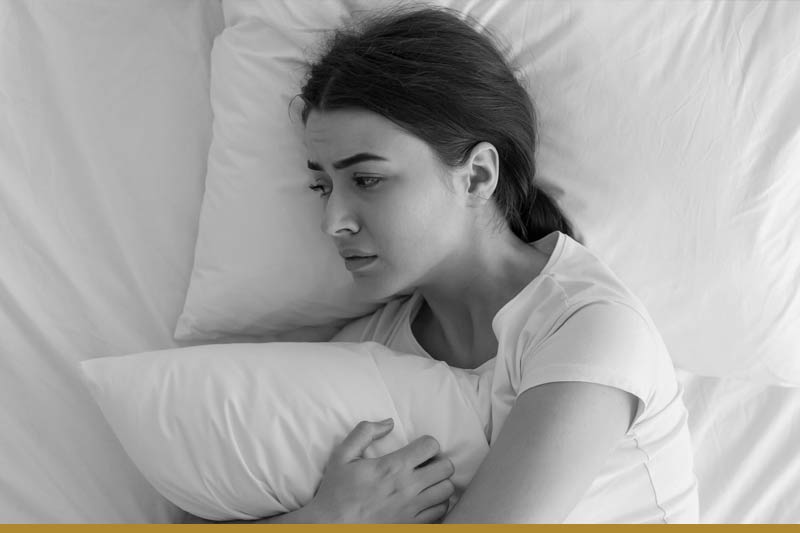Sleep plays a crucial role in overall well-being, affects both physical and mental health. Good quality sleep supports the immune system, blood pressure, breathing, cardiovascular health, growth, and recovery but also helps you feel rested and ready to face the day.
Hormonal imbalances can disrupt the restorative cycles of deep rest, leading to chronic insomnia. This article explains which hormones cause insomnia and describes available treatment options.

Hormones control the sleep-wake cycle and regulate sleep patterns. Any hormonal imbalance can impact sleep quality, leading to insomnia – difficulty falling and staying asleep.
Hormonal insomnia is a health condition that affects women more often than men. Poor sleep is one of the many symptoms women experience during different life stages when hormones fluctuate: menstruation, pregnancy, perimenopause, or menopause.
Sleep needs change over time and varies from person to person. Adults aged eighteen to sixty may find seven or more hours a night is enough, while older people may need up to nine hours to feel completely rested. It is essential to consider age and individual needs to understand whether insomnia is triggered by hormonal changes.
Erratic hormonal shifts can produce a range of sleep-disturbing side effects. The most common hormonal insomnia symptoms are:
Note: If lack of sleep is leaving you feeling drained, exhausted, and unable to focus, consider vitamin B12 injections to boost your energy levels in a healthy, natural way.

Hormonal dynamics affect both the amount and the quality of sleep. If hormones are out of balance, they can cause mild sleep disturbances or severe sleep disorders, such as insomnia.
As the sun sets, the pineal gland in the brain releases this hormone to prime the body for deep rest. Melatonin is known as the “sleep hormone’’ because it controls the circadian rhythm, the body’s internal clock that regulates various processes including the sleep-wake cycle.
Melatonin’s primary function is to reduce nerve activity and relax the body. It is also responsible for lowering the body temperature in preparation for a good night’s sleep.
Melatonin production is closely related to exposure to light. Artificial light and especially the blue light of electronic devices lowers melatonin levels, hindering sleep. To help the body release melatonin at the right time, it is important to get exposure to sunlight at the right time of day – in the morning and early afternoon.
Note: Melatonin also belongs to a group of hormones responsible for body temperature regulation. When imbalanced, these hormones may cause cold or hot flashes, accompanied by profuse hormonal sweating.
This sex hormone, vital for reproductive health, decreases in perimenopause and menopause. During this period and at other times when estrogen levels fluctuate (pregnancy, menstruation), women frequently report problems with sleep, indicating the important role estrogen plays in sleep regulation.
One of the ways estrogen affects sleep quality is by lowering body temperature at night. Furthermore, estrogen plays a vital role in producing serotonin, the neurotransmitter that is converted to melatonin in the dark.
Note: Learn more about the implications of chronically low estrogen levels.
This hormone plays a vital role in women’s reproductive health and helps maintain a healthy pregnancy. It also regulates parts of the brain responsible for sleep-wake behavior, influencing the quality and quantity of sleep.
Progesterone inhibits the activities of certain neurotransmitters, promoting relaxation and reducing anxiety. Its sedative properties are the main cause of daytime sleepiness in the early stages of pregnancy, when progesterone levels peak.
On the other hand, progesterone levels dip right before the period starts, which is why women suffering from premenstrual syndrome (PMS) or premenstrual dysphoric disorder (PMDD) may experience poor sleep quality.
Note: The effect of hormones on our psychological state has been firmly established by science. One of many remarkable discoveries is the correlation between hormonal fluctuations and anxiety disorders. Learn more about hormonal anxiety, including what triggers it, how to recognize it, and how to treat it
Insulin, the hormone responsible for regulating blood glucose levels affects sleep quality indirectly. This is particularly true for diabetic or pre-diabetic patients, whose mechanisms for blood sugar regulation are disrupted.
High blood sugar (hyperglycemia) overstimulates the kidneys, causing frequent urination and disrupting nighttime rest. Excess blood sugar also prompts the production of epinephrine (adrenaline) and norepinephrine. These two neurotransmitters raise blood pressure and heart rate and put the body in a state of alertness.
Conversely, low blood sugar (hypoglycemia) may cause uneasy sleep, confusion, nightmares, and sweating. Hypoglycemia can occur if a patient takes an insulin shot just before bedtime.
In a vicious cycle, even a single night of missed sleep affects insulin sensitivity and causes raised blood sugar levels.
Note: Trouble sleeping, accompanied by weight gain could be a sign that your body is not responding to insulin. If you are looking to lose weight, learn more about how chronically elevated insulin affects weight loss, and how insulin resistance affects weight loss.
Cortisol, the so-called “stress hormone”, is essential for keeping the body awake and alert. It peaks in the morning to prepare you for daily activities to naturally drop later in the day when melatonin is released in preparation for sleep.
Cortisol levels are directly affected by diet (high intake of fats, sugar, salt, and animal proteins), stress, and trauma. High cortisol levels in the afternoon and evening can disrupt the 24-hour circadian flow, leading to sleep difficulties such as insomnia.
Testosterone impacts sleep quality, particularly in men. Studies show that testosterone plays an important role in deep sleep – the phase when most of the rest and recovery occurs. Consequently, disrupted levels of testosterone can cause sleep disturbances.
Low levels of testosterone typically provoke insomnia and nighttime waking, while high levels of testosterone impair sleep quality through increased nocturnal metabolic rate.
Note: If you have trouble staying asleep, check your testosterone levels. Hormonal insomnia caused by low testosterone levels can be treated with testosterone therapy. Contact our team to learn more about the treatment and book your appointment.

Hormonal insomnia can be treated by gradually introducing lifestyle changes and using products with hormone-balancing ingredients and calming and aromatherapeutic properties.
To relieve the symptoms of hormonal insomnia, begin by making smaller, incremental adjustments. These quick sleep tips can help you get started:
Note: Check out our list of the 10 best nutritional supplements for hormone balancing.
Once you’ve created a solid sleep routine, tackle the hormonal problem at its roots with some of these treatments:
Consult your medical provider before choosing any of the listed products.
Note: Vibrant Vitality Clinic offers female bioidentical HRT to help women go through the transition smoothly and reduce the exhaustion that poor sleep can bring.
If despite all your efforts you are still suffering from a lack of sleep, seek out professional medical help. Insomnia is more than just tossing and turning all night long. It can seriously affect your physical and mental health, relationships, and quality of life. Furthermore, long-term sleep deprivation can worsen existing health conditions and hormonal imbalances.
Contact the Vibrant Vitality Clinic team to discuss your situation. Our experts will help you create a customized hormonal insomnia treatment.
Note: If your sleep is disrupted and you suspect it is because of imbalanced hormones, monitor the state of your hair. Hormonal hair loss is one of many conditions caused by hormonal imbalances.
Hormonal insomnia comes in all shapes and forms, triggering a cascade of potential physical and mental health threats, such as hormonal depression. Understanding how hormones promote or impede deep, is an essential first step in combating this unpleasant condition.
Smart preventive measures keep hormones balanced, helping you feel more focused, alert, and well-rested in the morning. Schedule a consultation with top experts at Vibrant Vitality Clinic to find the most effective solution to this problem.




4325 E Indian School Rd, Suite 130
Phoenix, AZ 85018
United States
(480) 422-2058
info@vibrantvitalityclinic.com
Monday - Friday: 9:00 am - 6:00 pm
Saturday: 9:00 am - 3:00 pm
Sunday: Closed
